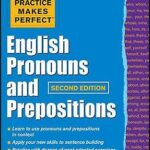Dependent Prepositions. When Some adjectives go with certain prepositions. Prepositions in English with examples of prepositions. English grammar with exercises. Free eBook and Free printable PDF.
Dependent Prepositions

Prepositions in English
Prepositions: uses
We commonly use prepositions to show a relationship in space or time or a logical relationship between two or more people, places or things. Prepositions are most commonly followed by a noun phrase or pronoun (underlined):
The last time I saw him he was walking down the road.
I’ll meet you in the cafe opposite the cinema.
It was difficult to sleep during the flight.
It was the worst storm since the 1980s.
Give that to me.
There are over 100 prepositions in English. The most common single-word prepositions are:
https://dictionary.cambridge.org
| about | beside | near | to |
| above | between | of | towards |
| across | beyond | off | under |
| after | by | on | underneath |
| against | despite | onto | unlike |
| along | down | opposite | until |
| among | during | out | up |
| around | except | outside | upon |
| as | for | over | via |
| at | from | past | with |
| before | in | round | within |
| behind | inside | since | without |
| below | into | than | |
| beneath | like | through |
Although most prepositions are single words, some pairs and groups of words operate like single prepositions:
They were unable to attend because of the bad weather in Ireland.
Jack’ll be playing in the team in place of me.
In addition to getting a large fine, both brothers were put in prison for three months.
I always get nervous when I have to speak in front of an audience.
We estimate that there’ll be up to 10,000 people at the concert.
The most common prepositions that consist of groups of words are:
https://dictionary.cambridge.org
| ahead of | except for | instead of | owing to |
| apart from | in addition to | near to | such as |
| as for | in front of | on account of | thanks to |
| as well as | in place of | on top of | up to |
| because of | in spite of | out of | |
| due to | inside of | outside of |

Dependent Prepositions
Some adjectives go with certain prepositions. There are no grammatical rules for which preposition is used with which adjective, so it’s a good idea to try to learn them together.
Remember that a preposition is followed by a noun or a gerund (-ing form).
However, there are some patterns that can help you:
With at
We use at with adjectives like good/bad/amazing/brilliant/terrible, etc. to talk about skills and abilities.
He’s really good at English.
She’s amazing at the piano.
They’re terrible at organising anything.
I’m not very good at drawing.
With about
We often use about with adjectives of feelings like angry/excited/happy/nervous/sad/stressed/worried, etc. to explain what is causing that feeling.
I’m angry about the decision.
He’s nervous about the presentation.
She’s excited about the new job.
They were worried about the exam.
With of
However, sometimes we use of with feelings.
She was afraid of telling her mum.
I’m frightened of having an accident.
He’s scared of flying.
You should be proud of your progress.
With to
We can use to to show the connection between people or things.
He’s married to the director.
I’m addicted to my phone.
I’m allergic to nuts.
It’s similar to the old one.
We can also use to to talk about someone’s behaviour towards someone else.
They were really friendly to me.
Was he nice to you?
He is always polite to everyone.
She was very rude to the waitress.
With for
Exercise is good for you.
Stress is bad for you.
The town is famous for its cheese.
I’m responsible for the financial side of the business.
With in
She’s interested in the project.
They want someone who’s experienced in design.
I didn’t want to get involved in the argument.
Here are some common dependent prepositions:
| Verbs and Dependent Prepositions | Adjectives and Dependent Prepositions | Nouns and Dependent Prepositions |
| depend on | according to | on purpose |
| argue with someone/ argue about something | interested in | decrease in |
| apologise to someone/apologise for something | afraid of | difference between |
| believe in | based on | advantage of |
| worry about | famous for | without doubt |
| rely on | excited about | at risk |
| comment on | good at | in theory |
| speak to someone/speak about someone/speak for someone | keen on | in trouble |
| talk to someone/talk about something | similar to | under guarantee |

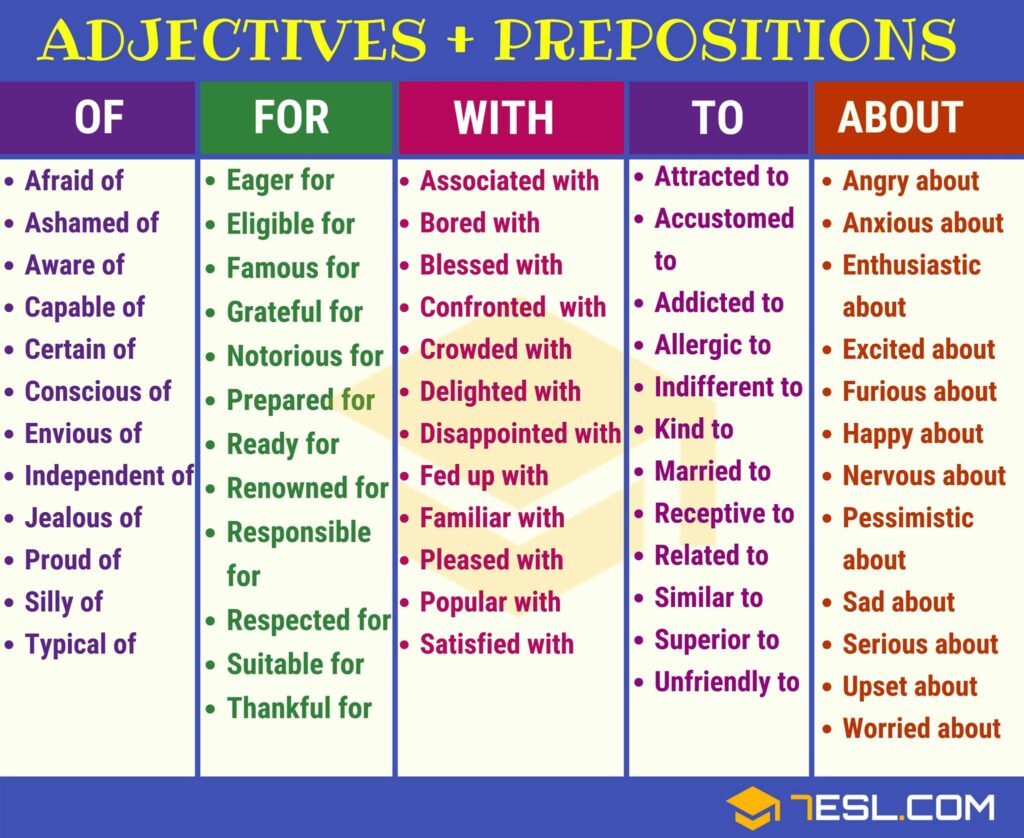
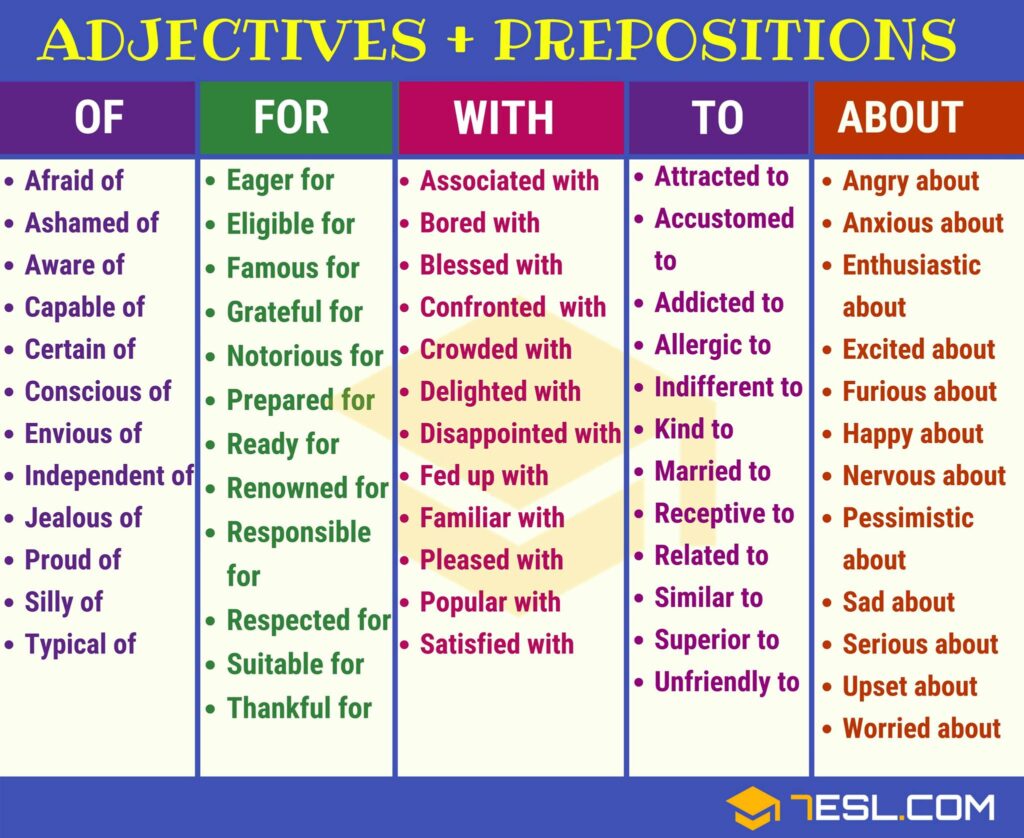
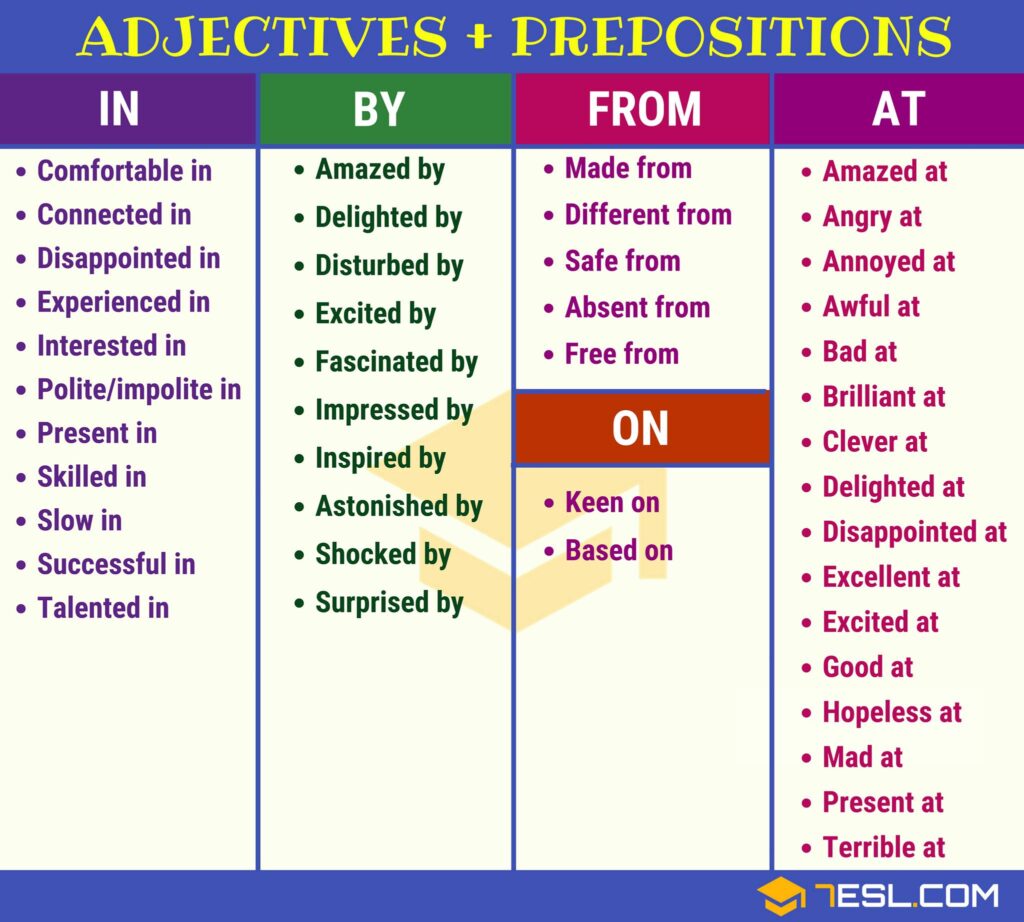
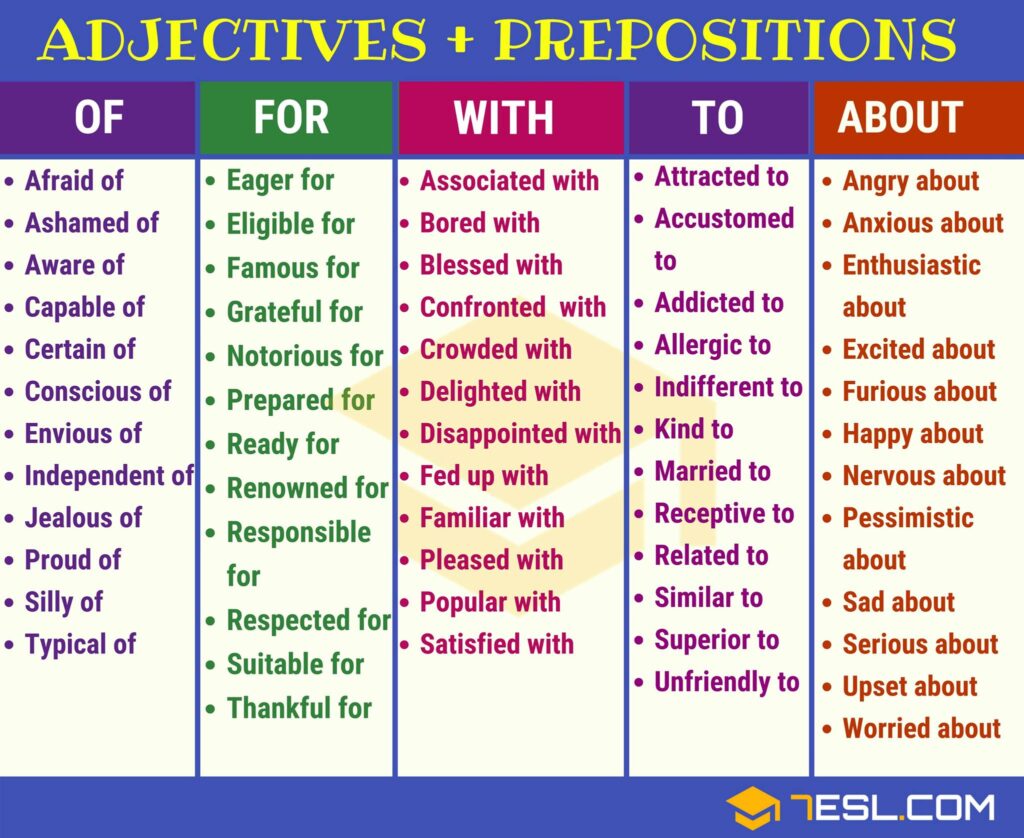

Exercises
Prepositions in English
PREPOSITIONS
EXERCISE 1.
Please fill in the gaps with the correct preposition:
BY ON FOR
e.g. I went to Greece by sailing-boat. It was amazing!
- Oh no, I’ve forgotten my credit card. I will have to pay ____ cash.
- I saw a really good programme ____ television last night.
- I always have tea and toast ____ breakfast.
- What a beautiful day! Let’s go ____ a walk.
- Peter hates speaking ____ the telephone.
- This week I must go to Frankfurt ____ business.
- “Hamlet” was written ____ Shakespeare.
- It is Mary’s birthday today, why don’t we go ____ a drink to celebrate?
- Last year I went ____ holiday to Greece.
- I dialed a wrong number ____ accident.

DEPENDENT PREPOSITIONS WITH ADJECTIVES
EXERCISE 1.
Complete the following sentences by adding the correct preposition.
e.g. I have been made aware _________ the problem.
I have been made aware of the problem.
- He didn’t seem pleased ________ the proposal, did he?
- I’m so angry _________ what John said.
- Don’t you think that it was nice ______ Paul ______ help us?
- Sylvia has been noted ______ her natural ability to get on with everyone.
- I’m terrified ________ the dark.
- Naomi is furious ________ me.
- They are very concerned __________ their son’s progress at school.
- I’m hopeless _________ German. I find it so difficult to learn.
- I’m surprised _________ Helen. She’s normally so polite to everyone.
- They were so shocked _________ the news that they remained speechless.
- Kevin is so conscious _________ everything he says or does.
- We’re brilliant ________ tennis. We play in all the competitions.
- Are you interested ________ art? I really enjoy visiting art galleries.
- It was so rude ________ them not to even phone to say they weren’t coming.
- I thought it was so mean __________ her to say those things about Paul.
- Were you annoyed _________ what we did?
- The teacher was pleased _________ our test results.
- I wanted to have a picnic this weekend but I’m a little worried _________ the weather. I heard it was going to rain.
- He was delighted __________ the thought of going to Spain for a week.
- It was silly ________ you to come all this way.
ADJECTIVE + PREPOSITION
EXERCISE 1.
Choose the correct preposition
e.g. I’m sorry but/of/about your accident
- We weren’t impressed by/of/about his speech.
- Is a male more similar by/to/of a donkey or a horse?
- He’s not very interested by/to/in his work.
- We’re short by/to7of a player. We need 4 people to play bridge.
- I feel very sorry with/for/by Milly. She’s lost her mother.
- It’s a wonderful place and famous with/for/by its scenery.
- I’m not particularly fond by/to/of beer.
- They’re responsible from/for/by the mess we’re in.
- They’re opposites. They’re completely different with/for/by the mess we’re in.
- She’s not really capable of/by/to making decisions anymore.
DEPENDENT PREPOSITIONS
EXERCISE 1.
Fill in the blanks with a suitable preposition.
for / on / of / in / to /
e.g. Contrary to what the Pope preaches, condoms may help avoid the transmission of diseases such as Aids.
- There is always a limit ____ everything.
- Queen Elizabeth II didn’t have much admiration _____ Lady Diana.
- Contrary ________ her father’s wishes, Jane went to the high school dance.
- All Opening students study English in the hope ____ improving their language skills.
- What you’re about to see will, I’m sure, make a big impression _____ you.
- Most Italians take pleasure ___ travelling abroad.
- Her young daughter cries all night and apparently, there’s no reason _______ it.
- John’s very happy with his boss. He’s just noticed there’s been an increase _____ his wages!
- The union members are furious about what they consider as an attack _____ their rights.
- There are two possible solutions ______ that problem.
- Is there any chance _____ getting two tickets to the U2 concert in July?
- All the players have confidence ____ their coach.
- You know, whatever he says, I can’t see any reason ________ his behaviour last night.
- Philip obviously made a good impression ________ the interviewer – he’s got the job!
- Bill, is there any chance_________ borrowing some money until pay day?

BROWSE THE EBOOK ONLINE OR DOWNLOAD THE PDF FOR FREE

All downloads are in PDF format



